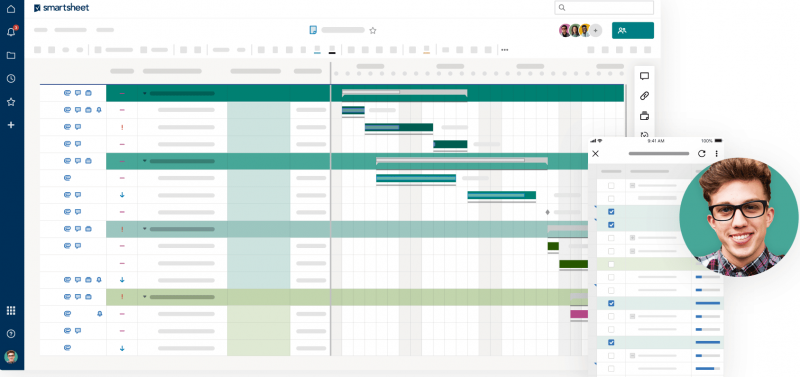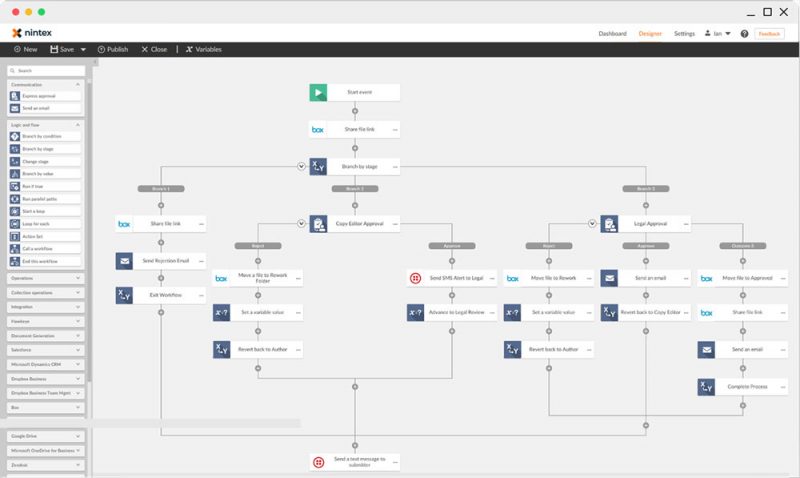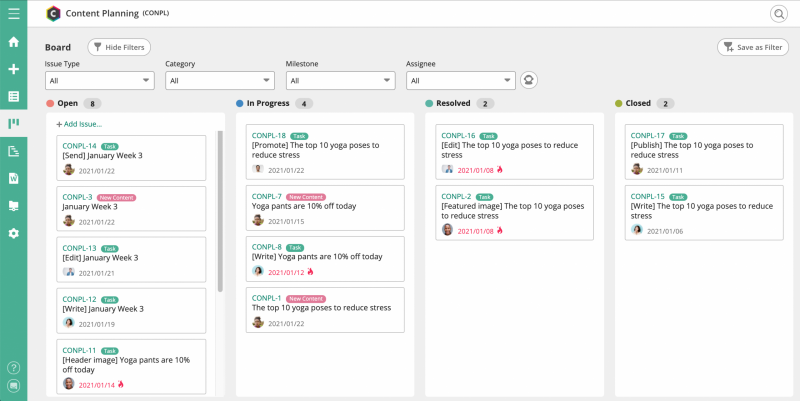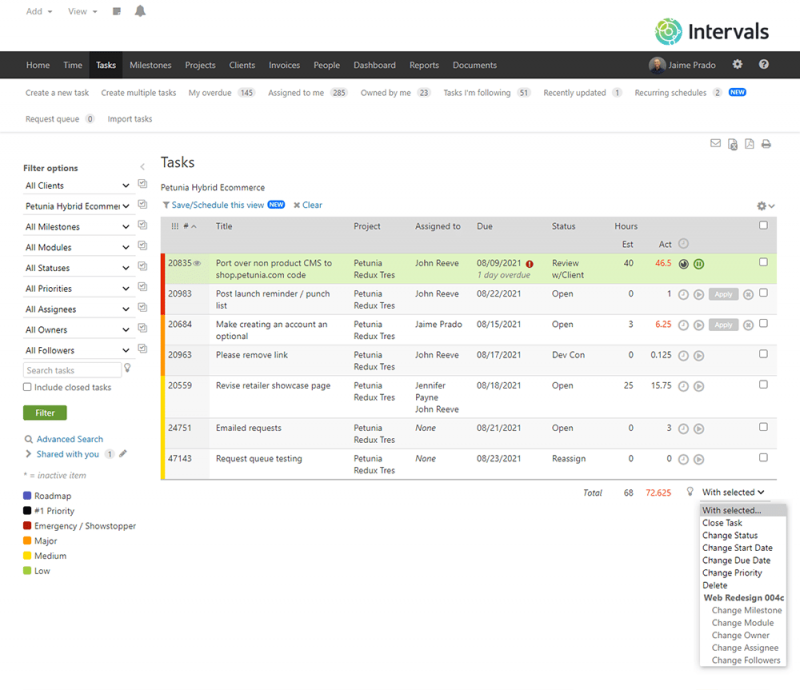The content marketing industry is showing no signs of slowing down anytime soon. Whether you’re producing social media posts, blogs, or newsletters, a content workflow will allow you to optimize your efforts and improve your output and results.
Keep reading to discover the 10 best content workflow software solutions on the market to keep your content teams consistently producing pieces that deliver results.
The Best Content Workflow Software: Our Top 10 List
We’ve rounded up the best tools for handling a variety of content strategies and projects. Here’s what they’re best suited for:
- Monday.com — Overall, the best tool for managing your content workflow
- ClickUp — Popular content workflow software for businesses of all sizes
- Smartsheet — Flexible spreadsheet-style PM tool to manage content
- Hive — Fantastic small business content marketing workflow software solution
- Wrike — Impressive content project management tool for mid-sized businesses
- Nintex — User-friendly workflow design tool for large businesses
- Backlog — Basic task tracking tool for small business content management needs
- Zoho Projects — One of the cheapest content workflow tools for small businesses
- Trello — The simplest content marketing workflow solution for startups and small businesses
- Intervals — A user-friendly task and project tracking tool to easily create content workflows
We’ve explored each one’s features, pricing, scalability, ease of use, customer service (and overall support), plus honest customer reviews to ensure that only the best made it on our list.
Whether you’re looking for the best social media content workflow software, a tool to handle your e-book creation process or any other content production task — we’re confident that these are the best tools for creating a well-documented content workflow.
Top 10 Content Workflow Management Software: Reviewed
In the following sections, we’ll delve into each platform’s features, pricing, and pros and cons to help you work out which tool best suits your needs.
Let’s get started!
1. Monday.com — Overall, the Best Tool for Managing Your Content Workflow
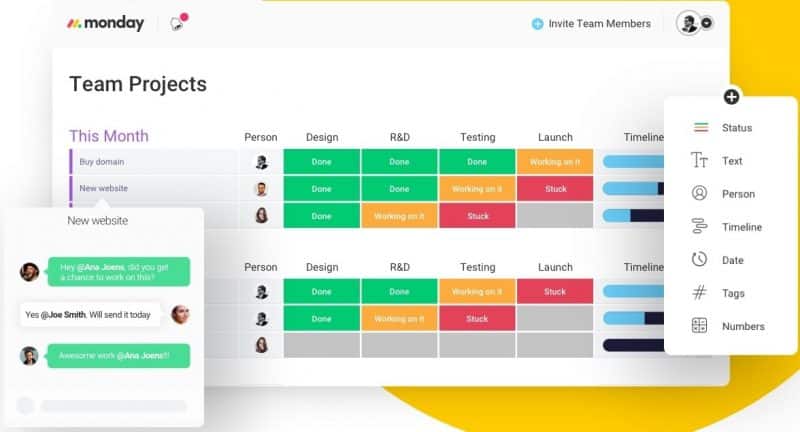
The beauty of Monday.com is that you can create a workflow for practically anything — and there are over 200 templates to help you get started, including ones for content creation.
Plus, you have great automation options for things like deadline notifications or revision requests, allowing your content teams to focus on getting the important work done.
Overall, this tool is incredibly versatile. It’s also one of the best social media content workflow software tools for planning your posting schedules and tasks — and you can schedule them all within Monday.com!
Need we say more? Honestly, there’s no better tool for your content workflow management needs.
Special Features:
- Assign tasks to team members, set due dates, and reminders
- Board, timeline, Gantt, form, calendar, and more views
- Over 30 column types for workflow customization
- In-app tagging, instant messaging, and sharing capabilities
- Integrate with 40+ external apps (Slack, Zapier, etc.)
- Project time tracking, timesheets, and billable reports
Pricing:
Monday.com has the following plans:

On the Basic plan, you get custom notifications, unlimited docs, and boards, but for features like automations and calendar and chart views, you’ll want to opt for the Standard plan.
If you won’t take our word for it, test Monday.com for free.
There’s a risk-free 14-day free trial, and we’re confident you’ll be as amazed as we were; if not, there’s a solid 30-day refund policy on offer.
Pros:
- 200+ templates, including content management templates
- Fantastic for planning any marketing strategy
- Offers superb automation and collaboration features
Cons:
- Automation is only on the Standard plan, and up
|
Best For |
Monthly Billing | Cheapest Plan | Users for Starting Price | Free Version |
Guarantee/Refund |
| Any-sized business | Starts at $10/user | $8/month (annual) | 1 | Plan + 14-day trial |
30-day refund policy |
2. ClickUp — Popular Content Workflow Software for Businesses of All Sizes
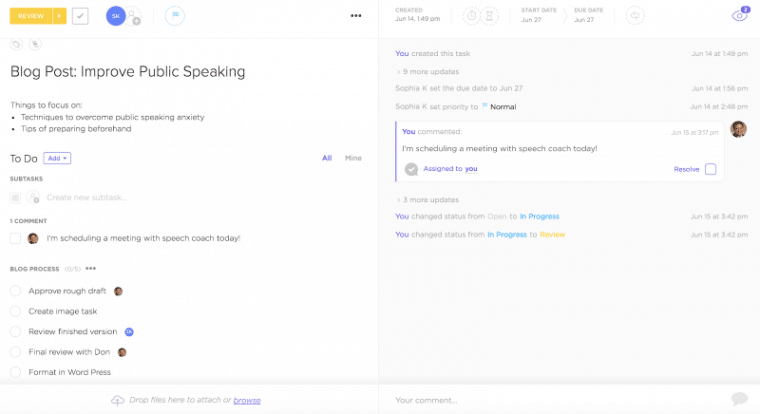
It’s no surprise that ClickUp is so popular. With this tool, you can organize your content plans, users, folders, and everything else in one location and always easily find whatever you’re looking for.
Its versatility makes it ideal for resource and project management across countless industries and all business sizes.
For content, it’s a great way to manage your blog ideas and editorial calendar, etc., plus you can use one of the many templates or create your own to avoid re-doing the same content processes over and over again.
You also get over 15 ways to visualize your projects, and powerful IF/THEN automation rules for things like assigning a task to a member once the status is changed (so articles are automatically assigned to editors for example).
Finally, ClickUp has excellent in-app collaboration capabilities, with a built-in chat, email, document sharing and a doc creator for live collaboration.
Special Features:
- Create tasks and track progress with real-time reporting
- In-app time tracking and reporting
- Integrate with 1,000+ external apps
- 50+ custom workflow automations
- Huge range of views to visualize projects
Pricing:
Here are ClickUp’s plans:
The Unlimited plan gives you unlimited storage, integrations, dashboards, Gantt charts, and custom fields.
You’ll want to opt for the Business plan and higher for added functionality like advanced automations, workload management, timeline view, and custom roles and permissions.
Monthly billing jumps to $9/user on the Unlimited plan but considering what’s on offer; it’s still really affordable.
Plus, if you find that it isn’t for you, there’s a 30-day money-back guarantee on offer.
Pros:
- Ample integrations and templates
- User-friendly, intuitive, and highly customizable
- Superb for content planning, tracking, and collaboration
Cons:
- There’s a slight learning curve
- Automation is only on the Business plan, and up
|
Best For |
Monthly Billing | Cheapest Plan | Users for Starting Price | Free Version | Guarantee/Refund |
| Any-sized business | Starts at $9/user | $5/month (annual) | 1 | Free plan |
30-day guarantee |
3. Smartsheet — Flexible Spreadsheet-Style PM Tool to Manage Content
Smartsheet uses spreadsheet-style project management to help you plan your content, align your team, and achieve more with automated workflows.
There are a bunch of content-specific templates, and unlike Microsoft Excel, Smartsheet is flexible and customizable.
You can also automate and streamline your approval process, create custom alerts, notify members of deadlines and requests, schedule reports, and more without lifting a finger!
Plus, you’re not limited to spreadsheets! You can monitor your content strategy in other views such as grid, Gantt, calendar, and Kanban boards!
Special Features:
- Advanced reporting synced to your data
- Internal and external collaboration capabilities
- Integrate with Slack, Google Workspace, and others
- Custom synced team calendars
- Manage your portfolio, budgets, and workload
- Monitor time spent on tasks and projects
- Assign members to tasks in your sheet
Pricing:
Smartsheet has these 3 plans on offer:
Monthly billing starts at $9/user, and the Business plan requires you to pay for a minimum of 3 users.
The Pro plan is a great option if you only need up to 10 users. But you’ll want to opt for the Business plan if you need features like unlimited editors, the ability to publish sheets, reports, dashboards, unlimited automations, and proofing.
Luckily, you have a full 30 days to test Smartsheet for free.
Pros:
- Great for managing a variety of projects and data
- Offers flexibility, customization, and powerful automation
- Can also track projects in other popular views
Cons:
- The interface could be improved
- It isn’t as feature-rich as some of the other tools
|
Best For |
Monthly Billing | Cheapest Plan | Users for Starting Price | Free Version | Guarantee/Refund |
| Spreadsheet-style workflow management | Starts at $9/user | $7/month (annual) | 1 | 30-day trial |
No |
4. Hive — Fantastic Small Business Content Marketing Workflow Software Solution
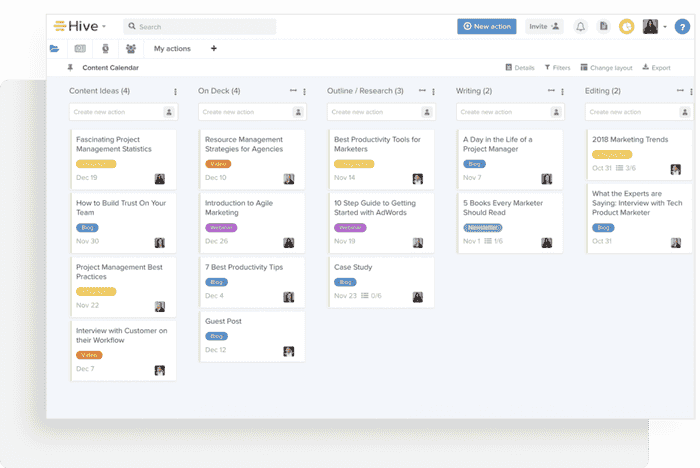
As one of the best small business project management tools, Hive has what you need to manage and streamline your content workflow.
You can automate repetitive tasks (even across external apps like Slack and Zoom) and make your approval process flawless.
There’s real-time editing, in-app chat and email, and more to collaborate with clients, team members, and contractors, and you can view your content workflow with Gantt charts, Kanban boards, calendar, table, and portfolio project views.
You can even create and re-use project templates to save time and customize them to fit your workflow with custom fields, statuses, and cards.
Special Features:
- Add comments, emails, sub-tasks, and attachments to cards
- Integrate with 1,000+ external apps
- Built-in task time tracking and timesheets
- Set task priority and recurring tasks
- Team calendar and real-time notifications
Pricing:
Hive has a free plan and only 2 paid options:
What’s great is that for just $12/user, you get all the essential features, including the calendar, time tracking, Zoom, and Slack connections.
There is a fair jump in monthly subscription pricing to $16/user, but considering what’s on offer, Hive is still great value for small businesses.
Pros:
- Robust collaboration and project management tool
- Offers advanced workflow automation
- The platform is user-friendly and loaded with functionality
- Great visual content workflow software
Cons:
- There are limited plans on offer
- The mobile app could be improved
- The platform can be sluggish at times
- It could use some more automation capabilities
|
Best For |
Monthly Billing | Cheapest Plan | Users for Starting Price | Free Version | Guarantee/Refund |
| Small businesses | Starts at $16/month | $12/month (annual) | 1 | Free plan + 14-day trial |
100% guarantee |
5. Wrike — Impressive Content Project Management Tool for Mid-Sized Businesses
Wrike is a robust project management tool for creating and tracking your content workflow — whether by theme, product, title, topic, assignee, delivery date, etc.
You’ll be able to organize your different content types and improve your approval process, bring company-wide visibility to everything in the pipeline, create custom dashboards, and so much more with this software.
And whether you want to monitor your content projects with Kanban boards or shared color-coded calendars for each content type — Wrike is the answer.
With this tool, your teams will be in the loop about what needs to happen, the deadlines, and any task or project dependencies.
Special Features:
- Set up project and task progress notifications
- Track time spent on projects
- Manage resources and team workload
- Integrate with over 400 external apps
- Real-time customizable reporting
- Kanban board, spreadsheet, and table views
Pricing:
Wrike has the following 4 plans on offer:
You get some critical features in the free plan, but you’ll want to purchase the Professional plan if you need features like shareable dashboards and Gantt charts.
Overall, the Business plan is the best value for money, as it includes everything from custom fields and workflows, to project, task, and guest approvals, time tracking, and more.
You can test Wrike in all its glory free for a full 14 days.
Pros:
- Offers detailed custom reporting
- Great for content management and collaboration
- Superb for managing resources and dependencies
Cons:
- The search function could be better
- Integration support is somewhat lacking
|
Best For |
Monthly Price | Cheapest Plan | Users for Starting Price | Free Trial/Plan | Guarantee/Refund |
| Mid-sized businesses | $9.80/month | $9.80/month | 1 | Free plan + 14-day trial |
No |
6. Nintex — User-Friendly Workflow Design Tool for Large Businesses
Nintex is a powerful solution for managing creative processes such as a content workflow. You can streamline your review and approval stage, collaborate on content, and manage your projects in a way that best suits you and your teams.
Powerful automations let you generate, sign, and store documents and send automated messages to relevant team members to keep everyone in sync.
You can map out, visualize, and automate even the most complex content processes with ease. Plus, requests of all kinds are simple to manage.
Special Features:
- Create custom forms and dashboards
- Drag-and-drop built-in connection integrations
- Reduce risk with approvals, escalations, and notifications
- Integrate with Microsoft, Salesforce, and more
- Manage share permission settings
Pricing:
With Nintex, you have these 2 plans to choose from:
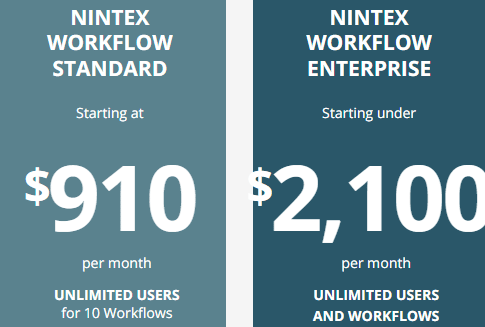
Although Nintex costs quite a bit more than the others on this list, the pricing is for an unlimited number of users (which is rare), you are still limited in terms of workflows on the Standard plan.
Nevertheless, you get unlimited everything on the Enterprise plan, and there’s a risk-free 30-day trial for you to test Nintex before committing to one of the above plans.
Pros:
- Great for optimizing complex processes
- User-friendly and visual interface
- Simple drag-and-drop workflow management
- One of the best client management tools
Cons:
- Workflow event logging could be more in-depth
- It’s expensive compared to other tools
7. Backlog — Basic Task Tracking Tool for Small Business Content Management Needs
Although Backlog is best for developers, it’s a good option for task tracking and managing things like content planning and marketing campaigns.
It’s not on par with advanced tools like Monday.com. However, you still get decent functionality like simple drag-and-drop Kanban boards and Gantt charts to monitor task dependencies. You can also create a content calendar to monitor your long-term content strategy.
Plus, you can create custom workflow content categories such as ‘Blogs,’ ‘Newsletters,’ etc., and you can easily filter your projects by assignee, due date, status, and more.
You also get built-in collaboration tools such as @mentions, conversation threads, file and resource sharing capabilities, and automatic notifications.
Special Features:
- Break projects down into tasks, subtasks, and checklists
- Add comments and files straight onto tasks
- Collaborate with clients and freelancers
- View a history thread of updates
- Integrate with Microsoft Teams, Slack, and others
- Add essential tasks to your ‘watchlist’
Pricing:
Backlog has a free plan for up to 10 users, but it lacks crucial features; here are the prices for all of the plans:
The Starter plan offers excellent value for money for 30 users, but you only get features like Gantt charts, burnout charts, and templates on the Standard plan.
Pros:
- Great for task management needs
- Create custom categories to fit your workflow
- Affordable for what’s on offer
Cons:
- Not as feature-rich as other tools
- You can’t assign a task to multiple assignees
- Reporting and interface could be improved
|
Best For |
Monthly Price | Cheapest Plan | Users for Starting Price | Free Trial/Plan | Guarantee/Refund |
| Small business task tracking | $35/month | $350/year ($29/month) | 30 | Free plan + 30-day trial |
No |
8. Zoho Projects — One of the Cheapest Content Workflow Tools for Small Businesses
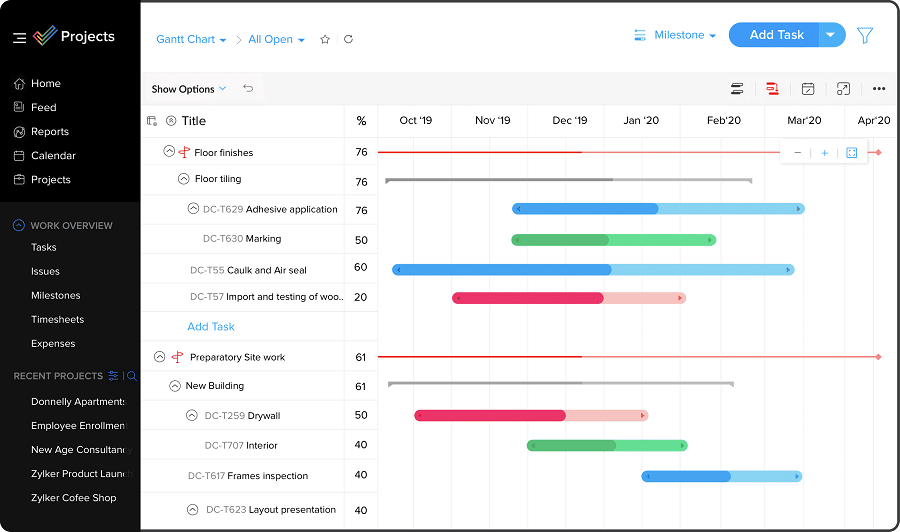
This cloud project management software tool is perfect for various uses, including managing creative projects such as social media posting, blog content schedules, and more.
You can easily establish a clear timeline for your content projects for complete transparency across the board.
And regarding collaboration potential, Zoho has loads to offer, including in-app chat and email support, a notification feed, real-time document editing, a shared calendar, and forums for group discussions!
Plus, you have time-saving automations like deadline reminders, auto task field updates, project status alerts, and highly customizable templates and views.
Special Features:
- Break projects down into task lists, tasks, and subtasks
- Save time and create templates for recurring tasks and projects
- Use custom views, fields, statuses, and functions
- Track the time spent on tasks for easy invoicing
- Monitor tasks with Kanban boards, Gantt charts, and calendar views
You also have loads of external integrations (including Microsoft tools and Zapier), plus the option to integrate with other Zoho apps, including one of the best CRM software tools, Zoho Desk, Docs, Analytics, and several more.
Pricing:
Zoho Projects has some of the lowest prices in this field; here are your options:

At just $4/month with an annual subscription, you get unlimited projects, Gantt charts, custom views, tasks, reminders, timers, and automations.
The Enterprise plan gives you some nice extras like custom fields and portfolio dashboards.
Pros:
- Create comprehensive dashboards
- Incredibly affordable for small businesses
- The platform is feature-rich
Cons:
- Customer support could be better
- Reporting capabilities are somewhat limited
|
Best For |
Monthly Billing Starts At | Cheapest Plan | Users for Starting Price | Free Trial/Plan | Guarantee/Refund |
| Small businesses | $5/month | $4/month (annual) | 1 | Free plan + 10-day trial |
30-day guarantee |
9. Trello — The Simplest Content Marketing Workflow Solution for Startups and Small Businesses
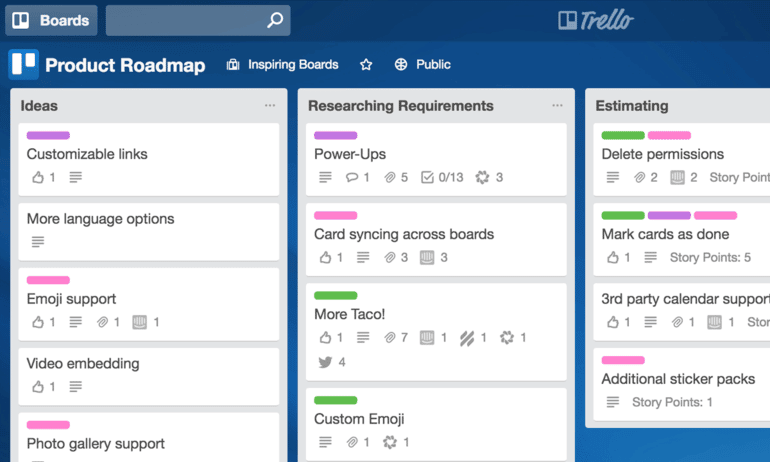
Trello — the least overwhelming tool on the planet is what the title should be for this section. Hence its popularity with startups and small businesses — although this is also due to its affordability and functionality.
As one of the best Kanban tools, Trello helps you simplify complex content workflows easily by organizing them visually by content type or status.
You can create templates for your writers in one of your lists, easily assign members to cards, add attachments, set due dates, create checklists, and comment directly on cards.
The calendar view option also makes Trello an excellent platform for creating editorial calendars!
Special Features:
- Integrate with Slack, Jira, Google Drive, and more
- Manage user permission settings
- Use custom fields, templates, and backgrounds
- Dashboard, timeline, table, calendar, and map views
- Automate your workflow and re-use checklists and cards
Pricing:
Trello has one of the best free content workflow software solutions for individuals, but there are also these 3 paid plans for businesses:
Monthly billing is just one dollar more at $6/user, and this plan gives you unlimited boards, cards, and custom fields. You get the best value with the Premium plan, though.
Trello is robust for small business needs but you might find that it falls short for more significant business needs.
Pros:
- Incredibly simple to use and visual
- Has creative content and editorial workflow templates
- All core content management features are free
Cons:
- You need to expand cards to track them
- The platform isn’t the best solution for larger businesses
10. Intervals — A User-Friendly Task and Project Tracking Tool to Easily Create Content Workflows
Intervals made it on our list as one of the best project tracking software solutions for content management because of its flexibility and functionality as a task tracking tool.
You can manage your tasks with Kanban boards, schedule tasks with drag-and-drop ease on the shared calendar, and even set up teams for projects to boost collaboration and productivity.
You can also set recurring tasks, email notifications, task priorities, and custom statuses to create custom content workflows that work best for your business and team.
Where Intervals shines is that it also comes with built-in time tracking and invoicing capabilities. Plus, it integrates with some of the best cloud-based accounting software solutions, allowing you to manage your projects and business from within Intervals.
Special Features:
- Client contact management tools
- Detailed reports and visual dashboards
- Create detailed invoices
- Create project and task templates for reuse
- Access detailed project summaries and task history
Pricing:
With a whopping 7 plans, Intervals has a plan for every budget:
The starting price is for 3 users and 3 projects. What’s nice about Intervals’ pricing is that you get all the features in each plan. These plans only differ in storage, user, and project limits.
There’s also a lengthy 30-day free trial on offer.
Pros:
- Flexible task management platform
- The interface is intuitive and easy to use
- Heaps of pricing plans on offer
Cons:
- Lacks collaboration tools and role permissions
- Integration can be challenging
|
Best For |
Monthly Billing | Cheapest Plan | Users for Starting Price | Free Version | Guarantee/Refund |
| Any-sized business | Starts at $29/month | $29/month | 3 | 30-day trial |
No |
Best Content Workflow Software: Table Comparison
Pricing and use cases generally play a huge role in decisions like these, and comparing platforms is far easier if you can do it at a glance.
Here are the crucial factors of each workflow software for an at a glance overview:
|
Content Workflow Tools |
Best For | Monthly Billing | Cheapest Plan | Users for Starting Price | Free Version |
Guarantee/Refund |
|
Monday.com |
Any-sized business | Starts at $10/user | $8/month (annual) | 1 | Plan and 14-day trial | 30-day refund policy |
| ClickUp | Any-sized business | Starts at $9/user | $5/month (annual) | 1 | Free plan |
30-day guarantee |
|
Smartsheet |
Spreadsheet-style workflow management | Starts at $9/user | $7/month (annual) | 1 | 30-day trial | No |
| Hive | Small businesses | Starts at $16/month | $12/month (annual) | 1 | Free plan + 14-day trial |
100% guarantee |
|
Wrike |
Mid-sized businesses | $9.80/month | $9.80/month | 1 | Free plan + 14-day trial | No |
| Nintex | Large businesses | Starts at $910 | N/A | Unlimited | 30-day free trial |
No |
|
Backlog |
Small business task tracking | $35/month | $350/year ($29/month) | 30 | Free plan + 30-day trial | No |
| Zoho Projects | Small businesses | $5/month | $4/month (annual) | 1 | Free plan and 10-day trial |
30-day money-back guarantee |
|
Trello |
Individuals and small businesses | Starts at $6/month | $5/month (annual) | 1 | Free plan + 14-day trial | 30-day refund policy |
| Intervals | Any-sized business | Starts at $29/month | $29/month | 3 | 30-day trial |
No |
These tools range from as little as $4 to as much as $910 per month for one or unlimited users. So regardless of your budget, you’re bound to find a suitable content marketing workflow software solution with this list.
What is Content Workflow Software?
Content workflow software (also known as a workflow management system) is a tool that allows you to visually map out and track your content creation and delivery process.
Having the steps outlined lets your content team know what’s needed and when, so they can complete the work on time.
The flexibility of these tools means that you’re able to create workflows for a variety of content strategy needs, including:
- E-book creation
- Social media posts
- Blogs and articles
- Newsletters
- Case studies
Overall, the best content workflow software keeps your team aligned with your content strategy, helps them consistently deliver results, improves collaboration, and so much more.
Why Do I Need Content Workflow Software?
Without a tool to map and track your projects, you risk wasting time, money, and valuable resources, ultimately leading to goals not being met — sales, leads, or anything in between.
Although there are so many reasons businesses of all sizes need content marketing workflow software, we’ve outlined the top 4 below:
1. Improves Collaboration and Accountability
One of the main benefits of this software is that you can assign (and often auto-assign) tasks to relevant team members. This gives them a clear understanding of their role in the workflow and establishes accountability for what they need to deliver.
These tools also have collaboration capabilities to keep all communications, document sharing, etc., in one localized area.
2. Increases Productivity and Work Quality
This is by far one of the best benefits of these tools.
With workflow automation capabilities, you’ll be able to save loads of time by automating repetitive work. At the same time, you’ll reduce common human errors and let your team focus on completing more valuable tasks.
The best content marketing workflow software also comes with templates that speed up the process and allow your teams to hit the ground running.
3. Create Ultimate Transparency
Workflow software allows your teams to be kept up to date on the status of projects and to effortlessly monitor their progress on a specific task in the workflow against the given deadline.
Your content team will also have a clear path and know what steps are complete, what still needs doing, and more with synced data across the board for full project transparency.
You’ll be able to easily monitor your content workflows in a way that best suits your business and pinpoint areas of improvement.
4. Manage From a Single Hub
Whether it be managing content requests, communications, document storing, and more — these content workflow tools let you have one centralized location for complete efficiency and transparency.
Everyone involved knows the process, their role in making it happen, the progress of the tasks and projects, and the end goal.
Overall, these software solutions are game-changing for any content management need because they’re essentially project management workflow tools that allow you to streamline the planning, execution, and delivery of any type of content.
Factors to Consider When Choosing the Right Content Workflow Software
Choosing software that seamlessly fits into your organization and works well with your team can be challenging. So here are 4 key considerations to keep in mind when making your decision:
1. Ease of Use and Flexibility
All of the workflow management tools listed in this guide offer varying user-friendliness levels; and some have higher learning curves than others.
Nevertheless, we’ve specifically picked out platforms with minimal learning curves or ones that provide superb customer support and resources to help if you need a hand.
Of course, a tool proving fantastic for one business might not work as well for you, so we highly recommend testing your chosen platform before you commit to a paid plan.
2. Customization and Templates
Businesses are different, and the best workflow design tools know this and allow for high levels of customization.
You’ll want to look for platforms that offer custom statuses, workflows, fields, and ready-to-use templates to allow you to make the platform fit your particular needs and for a smooth setup.
3. Integration Support
You might be looking to add a content workflow solution to your current tech stack — communication or email marketing tools, calendars, CRM software, or anything else.
You’ll want to double-check that your chosen content workflow tool can integrate with your current software, as each has varying support for external app integrations.
4. Pricing
Because workflow software solutions are priced per user, keeping this in mind when making your decision is essential.
Thankfully, we’ve considered this when compiling this list to ensure that we’ve included the best tools for varying needs and budgets.
Before committing, be sure to try out any demos, free trials, or free plans.
Conclusion: What is the Best Content Workflow Software Solution for 2025?
Mapping out and tracking your content strategy is crucial regardless of the size of your business, and as we’ve seen, it doesn’t need to cost you your sanity or break the bank.
Monday.com is by far our top pick for project and content workflow management. It’ll allow your team to stay organized, meet deadlines, and consistently produce quality content that drives desirable results. And all from just $8/month.
Whether or not it’s your chosen tool doesn’t matter. You can’t go wrong with Monday.com — it’s the best content workflow management platform on the market for 2025.

